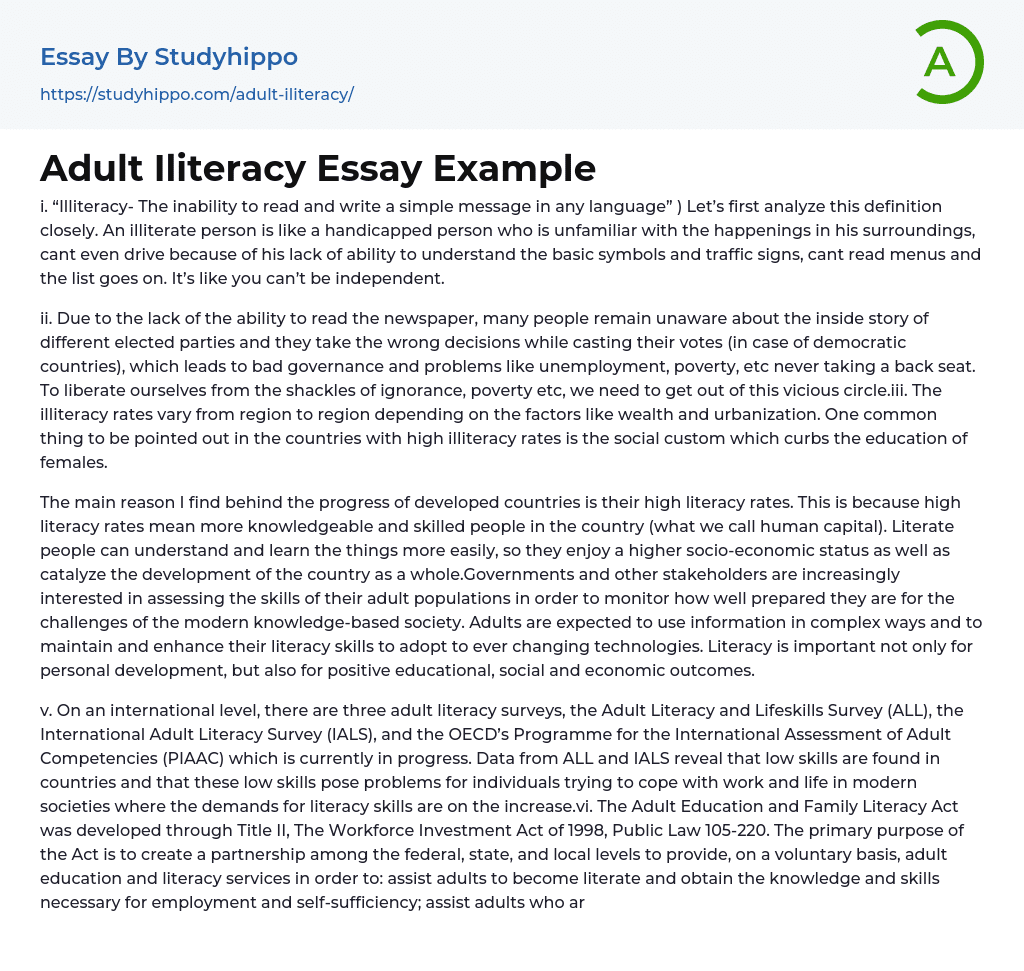The definition of "Illiteracy" emphasizes that individuals who cannot read or write are comparable to those with disabilities, as they lack the ability to understand their environment and navigate through daily tasks such as driving or reading menus. Ultimately, illiteracy restricts one's independence.
Inability to read newspapers can lead to insufficient understanding of political parties' internal affairs, potentially resulting in incorrect voting decisions that sustain problems like poverty and unemployment. To break this cycle, we must tackle both ignorance and poverty. While illiteracy rates differ depending on factors such as urbanization and wealth, several countries with high illiteracy have a cultural tradition that restricts the education of women.
High literacy rates in a country lead to the possession of more knowledge and skills by its population, also known as human capital. This contributes to overall development by enabling educated individuals to understan
...d and learn efficiently, resulting in a higher socio-economic status. Nowadays, stakeholders including governments evaluate adult literacy abilities to assess readiness for challenges in modern knowledge-based societies. Improving literacy skills is crucial for positive educational, social, and economic outcomes when adapting to technological advancements. Additionally, personal growth is significantly impacted by literacy.
There are three global assessments that evaluate adult literacy: the Adult Literacy and Lifeskills Survey (ALL), the International Adult Literacy Survey (IALS), and Programme for the International Assessment of Adult Competencies (PIAAC) by OECD, which is currently ongoing. Based on ALL and IALS results, numerous countries have insufficient levels of literacy, leading to challenges for individuals as societies require higher levels of literacy. The Adult Education and Family Literacy Act was established under Title II of Public Law 105-220 in 1998 with the aim o
fostering collaboration among federal, state, and local entities in providing voluntary education services to adults. Its main objectives are to assist adults in enhancing their literacy skills so they can secure employment and self-sufficiency while also supporting parents in acquiring educational abilities essential for actively participating in their children's development.
- Academia essays
- Higher Education essays
- Language Learning essays
- Studying Business essays
- Education System essays
- Study essays
- First Day of School essays
- Scholarship essays
- Pedagogy essays
- Curriculum essays
- Coursework essays
- Studying Abroad essays
- Philosophy of Education essays
- Purpose of Education essays
- Brainstorming essays
- Educational Goals essays
- Importance Of College Education essays
- Brown V Board of Education essays
- The Importance Of Higher Education essays
- Online Education Vs Traditional Education essays
- Academic And Career Goals essays
- Academic Integrity essays
- Brown Vs Board Of Education essays
- Distance learning essays
- Technology in Education essays
- Vocabulary essays
- Writing Experience essays
- Importance of Education essays
- Early Childhood Education essays
- Academic Degree essays
- Academic Dishonesty essays
- School Uniform essays
- Academic writing essays
- Cheating essays
- Bachelor's Degree essays
- MBA essays
- College Life essays
- Grade essays
- Diploma essays
- Phonology essays
- Sentence essays
- Filipino Language essays
- Pragmatics essays
- Millennium Development Goals essays
- History Of Education essays
- Graduate School essays
- Middle School essays
- School essays
- Special Education essays
- University essays




